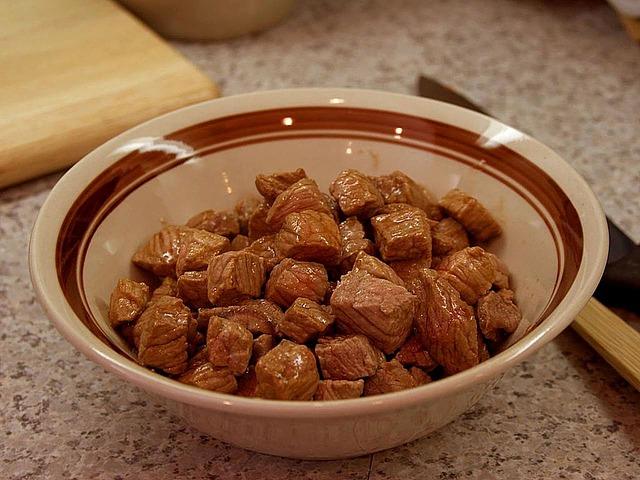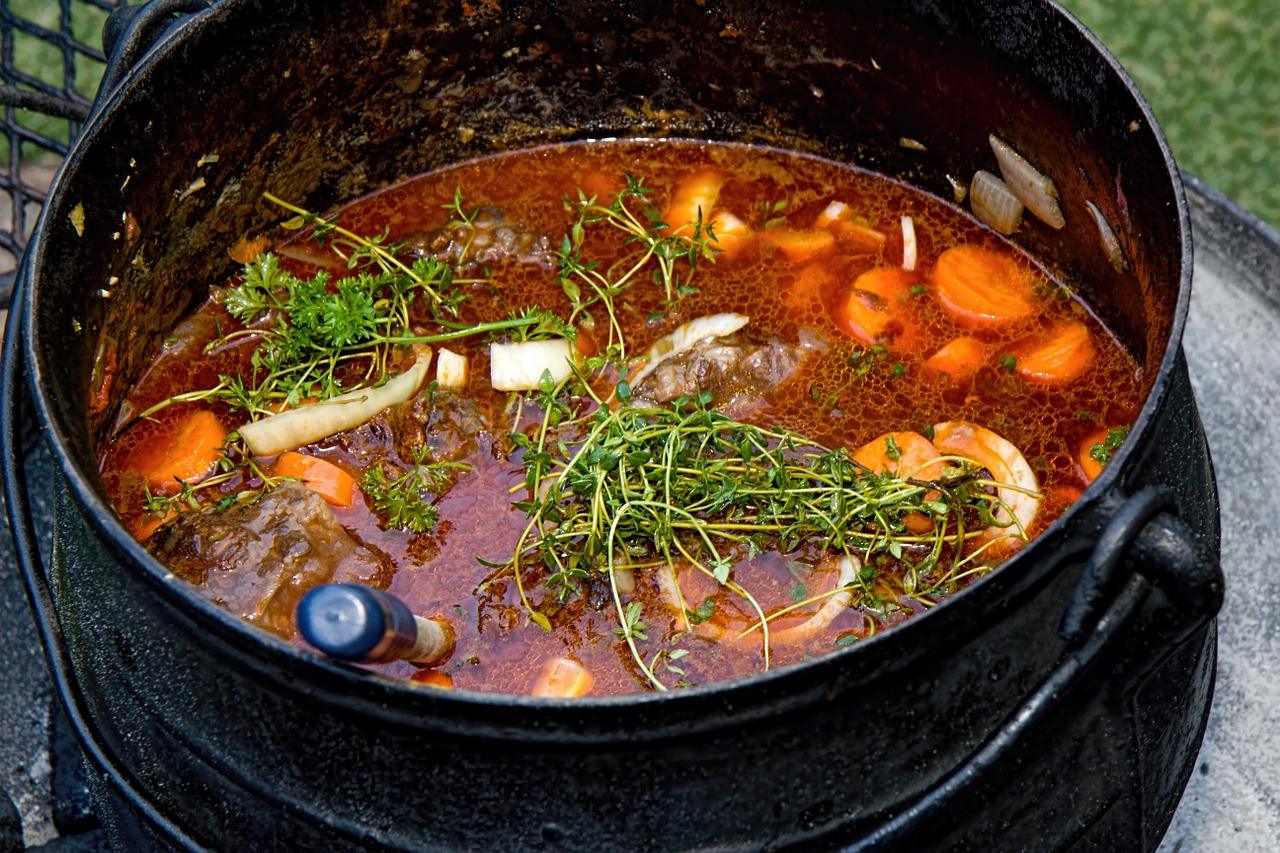Stew - the colloquially used name for canned stew. Sold everywhere and stored for a long time without loss of nutritional value. Since manufacturers deviate from state standards, the quality of the purchased product is in doubt, so I’ll tell you how to cook stewed meat at home.
Not every hostess decides to cook her at home, considering the task difficult and costly. In fact, there is nothing complicated in making homemade stew, it consists of natural ingredients without preservatives, meat wastes and substitutes. Different meats are used for cooking: beef, pork, chicken, rabbit meateven beaver meat.
Delicious Pork Stew Recipes
Canned meat is tasty and healthy if prepared independently. Technology cooking pork stew is simple but takes time. Homemade canned food is an addition to a side dish, an independent dish or a snack in the fresh air.
- pork 4 kg
- onion 3 PC
- salt 2 Art. l
- ground black pepper 1 tsp
- Bay leaf 10 sheets
- I pour the pork over with water and cut into medium slices, add the onion, salt and pepper passed through the meat grinder, mix. I send it in the refrigerator for half an hour. Sometimes I use other spices, but carefully, otherwise the taste will suffer.
- While the meat is languishing, I douse with water and sterilize glass jars. I put a bay leaf at the bottom of each container, and spread the pieces of pork on top. In each jar, I pour the water previously brought to a boil.
- I cover the bottom of the wide pan with a towel; I put jars of meat on top, covering it with lids. I pour water into the pan, bring to a boil, cover with a lid. Cook on low heat for 3.5 hours. I carefully monitor the water, add water if necessary.
- I roll the jars with the ready-made stew lids, turn them upside down and leave them to cool. Store in a refrigerator or a room with a low temperature.
I consider homemade stew prepared from pork as a universal product. She delights the family with delicious dishes and helps out when unexpected guests knock on the door.
Pork Head Stew
In taste and quality, the pork head stew is much ahead of the store counterpart.
- Pork head - 1 pc.
- Water - 2.5 l.
- Salt - 3 tablespoons.
- Black and allspice, bay leaf - to taste.
- I pour water over my pork head and gently cut off my cheek, otherwise the stew turns out to be too greasy. Separate the flesh from bones and cartilage, rinse, dry and cut into small pieces.
- I spread the prepared meat in a saucepan, add water, put on fire, wait for it to boil, reduce heat to a minimum and simmer for 3.5 hours. Half an hour before the end of cooking, add salt, pepper and laurel.
- I spread the boiled pork in sterilized jars with a volume of 500 ml and put in a wide pan, after covering the bottom with a towel. I add water so that the cans sink to the shoulders. I bring to a boil, turn down the heat, cook for 20 minutes.
- After the time has passed, I take the cans out of the pan, roll up the lids, wrap them in a blanket and leave to cool.I determine the finished product for storage in a cool place.
I use cans of a small volume for a reason, they are very convenient. One jar is enough to prepare several dishes, it does not take up much space in a backpack or refrigerator.
Cooking Beef Stew
Beef stew is combined with buckwheat, pasta, mashed potatoes or ordinary scrambled eggs, making the taste of the main course perfect. Some cooks use canned meat for pie toppings, others make them the base for pizza.
- Beef - 2 kg.
- Water - 3 tablespoons.
- Thyme - 2 branches.
- Bay leaf - 2 pcs.
- Pepper and salt to taste.
- I give beef water and dry with a paper towel. I cut into large pieces and spread in thick-walled dishes. I recommend using a good roasting pan, the tenderness and aroma of stew largely depends on it.
- Add water to the meat, cover the dishes with a lid, put on a small fire. I cook for 2 hours, periodically checking to see if there is any broth in the roasting pan. Two hours later I add salt, thyme and pepper, cover, turn off the heat and leave for 6 hours.
- After a time, I spread it in sterilized jars and roll it tightly with lids. Keep in a cool place or refrigerator.
Cooking video
To make the taste of beef stew unique, sometimes at the beginning of cooking I add a little onion and carrot. I clean the vegetables beforehand, douse them with water and cut them into large circles or cubes. Before pouring into cans, I take out the vegetables and discard them.
Proper Chicken Stew
Not every woman finds time to cooking delicious dishes, but the desire to delight the family with culinary delights does not disappear. Chicken stew comes to the rescue. It is cooked easily and quickly, and to taste significantly ahead of the product offered by shops and supermarkets.
- Chicken fillet - 2 kg.
- Black pepper - 8 pcs.
- Laurel - 4 leaves.
- Salt - 2 tablespoons.
- Ground pepper - 1 spoon.
- Marjoram - 1 pinch.
- I wash well 4 half-liter jars and set to sterilize. Watering chicken fillet, dry, cut off the fat (do not throw out, come in handy later) and cut into small pieces. Add salt, marjoram, ground pepper, mix.
- At the bottom of the sterilized jar I lay a bay leaf and a few peas of pepper. Fill with meat, cover with cling film. Be sure to make holes so that the steam exits unhindered.
- I put the cans with the future stew on the roasting pan and send it to the oven. I set the temperature to 200 degrees. I do not advise putting jars in a hot oven, they will burst. The carcass is 3 hours.
- For a third of an hour before the end of cooking, chop the fat that was first cut off, spread it on a frying pan and heat it. I take out the cracklings, salt the salt and leave it on the fire.
- At the end, I carefully take out the jars of stew, add a little melted fat to each to increase the shelf life, roll up the lids. I wait until the meat has cooled, and send it to a cool place.
Beaver Stew Recipe
Traditionally hunters smoked beaver meat. If this is not possible, make canned food, which is not inferior to the classic types of meat. Incredible taste, excellent aroma, frantic juiciness - characteristics of beaver stew.
- Beaver carcass - 1 pcs.
- Peppercorns - to taste.
- Bay leaf - to taste.
- Ground pepper - to taste.
- Salt to taste.
- I douse the beaver meat with water, free it from bones, cut off fat and films, cut it into pieces, put it in a bowl and fill it with water. Soak 12 hours. Since meat produces a lot of blood, I recommend changing the water several times.
- Dry the soaked meat with a paper towel, add salt and pepper, mix. At the bottom of the sterilized jar I lay a bay leaf and a few peas of pepper. I fill the jar with beaver meat. Leave 3 centimeters to the brim.
- I cover the bottom of the wide pan with a double-folded cloth; I put the cans on top.I pour hot water into the pan so that 3 cm remains to the edge of the cans. I cover the cans with lids and place them on the stove.
- As it boils, reduce the heat and cook for 7 hours. In the process of cooking water boils, so periodically add. The prepared stew is taken out of the water, roll up the lids, turn the lids down and wrap it up to cool.
Beaver stew is a delicacy, because this kind of meat is rarely found on sale. If you put such a treat on the table, it will satisfy their gastronomic wishes and will pleasantly surprise you.
Rabbit stew

Rabbit meat is a tender, tasty, healthy and dietary product. It is baked in sour cream, stewed in wine, put on the stew. The result is one - a hearty, tasty and aromatic dish.
- Rabbit - 800 g.
- Pork fat - 150 g.
- Salt and favorite seasonings to taste.
- Cut the carcass of a rabbit. At the end of the main processing, I douse the carcass with water, dry it and carefully cut the pulp. I cut into small pieces 2-3 cm thick.
- Spread the prepared meat on a tray, sprinkle with salt and leave for 8 hours. This time is enough for the rabbit to give up excess fluid. After time, I squeeze and fry in melted fat.
- Sprinkle fried rabbit pieces with spices and spread in sterilized jars. I usually use peppercorns and garlic. Then fill with the fat remaining after frying, and roll up.
I keep jars of rabbit stew in a cool place without access to light. If there is no such room, wrap each jar with thick paper or opaque material. Prescription stew is stored for up to six months.
Autoclave, Oven, Multicooking Tips
Stew - meat, which, thanks to prolonged stewing, acquires the properties of a canned product and retains freshness even after prolonged storage.
I’ll give you some useful cooking tips, and below I’ll look at recreating this indispensable product through an autoclave, oven and microwave.
- Quality stew is made from lean meat. Ghee is sometimes added lard.
- To cook beef stews buy one large piece of meat. Veal is not suitable, as it is inferior to beef in terms of taste.
- Pork is used with medium fat content. Experts recommend, if possible, include the brisket.
- Chicken is taken on bones, without skin.
- Cooking involves stewing without adding water 2.5-3.5 hours.
- To extinguish using thick-walled and vertically elongated dishes. Other containers are not suitable, in them the meat floats above the liquid, as a result, the cooking effect in its own juice disappears.
- The stew is stored in a cool, darkened place. Covers grease with ghee against rust.
In an autoclave
Meat is the source of protein that the human body needs. Frying or continuous cooking removes all the good ingredients. Autoclaving is different. Cooking conditions help maintain healthy fats, vitamins and carbohydrates. The final product becomes tender and juicy. Consider the process using an example.
- Pork - the size of an autoclave.
- Fat.
- Laurel, peppercorns, ground pepper - to taste.
- Spices for meat - to taste.
- Garlic to taste.
- Prepare liter jars. I take how much it will fit in the autoclave tank. I pour water on each jar and sterilize it.
- At the bottom I put a washed clove of garlic, a few peas of pepper, a bay leaf and a little chopped lard.
- I cut the washed pork into medium slices, put it in jars, sprinkle with salt and pepper, roll up the lids. Send to the autoclave.
- I pour water into the autoclave tank to cover the jars. I close the device, pump air up to 1.5 bar. I put the autoclave on the stove and wait until the pressure reaches 4 bar, then I turn off the heat and cook for 4 hours, tracking the pressure.
- After the time has passed, turn off the fire. I don’t open the autoclave. I wait until the water has cooled completely.It takes a day, after I take the stew out of the tank and send it to the cellar.
In the oven
In the absence of an autoclave, an oven will come to the rescue.
- Pork without veins - 800 g.
- Salo - 100 g.
- Salt - 1 spoon.
- Laurel - 2 leaves.
- Peppercorns - 6 amount
- I use pork without veins. Cut into medium slices, spread in a large bowl, add salt and mix.
- Glass jars are thoroughly washed, not sterilized. I spread the meat in them, after adding bay leaf and allspice. I put crushed lard on top. Not completely filled - I leave 2 cm of space.
- I cover the bottom of the baking sheet with low sides with a cloth, add a little water, put out the cans and send in the ovenhaving previously covered with covers. Be sure to take out the rubber bands.
- I set the temperature to 200 degrees and turn on the oven. After boiling the contents, I reduce the temperature to 150 degrees. I cook for 3 hours, periodically add water to a baking sheet.
- After time, I take out the cans and roll up the lids, returning the gum back.
In a slow cooker
I offer a recipe for stew with mushrooms in a slow cooker.
- Pork - 500 g.
- Beef - 500 g.
- Forest mushrooms - 500 g.
- Onion - 2 heads.
- Peppercorns - 10 pcs.
- Laurel - 3 leaves.
- Ground pepper and salt to taste.
- Pour pork and beef with water, dry with a paper towel, cut into slices. I chop the peeled and washed onion in half rings. I use small forest mushrooms as a whole, cut large ones into parts.
- I send the prepared ingredients to the multicooker bowl, activate the quenching mode, set the timer for 4 hours. After 3 hours I open the lid, add salt and seasonings, continue cooking under the closed lid.
- At the end of the program, I put it in banks, roll it up in a lid and put it in a cool place or refrigerator. Believe me, tasting this delicacy will bring a lot of pleasure.
As you can see, homemade stew is prepared from various types of meat and in various ways. The result of culinary work always, regardless of the technology and products used, lives up to expectations. Bon Appetit!










